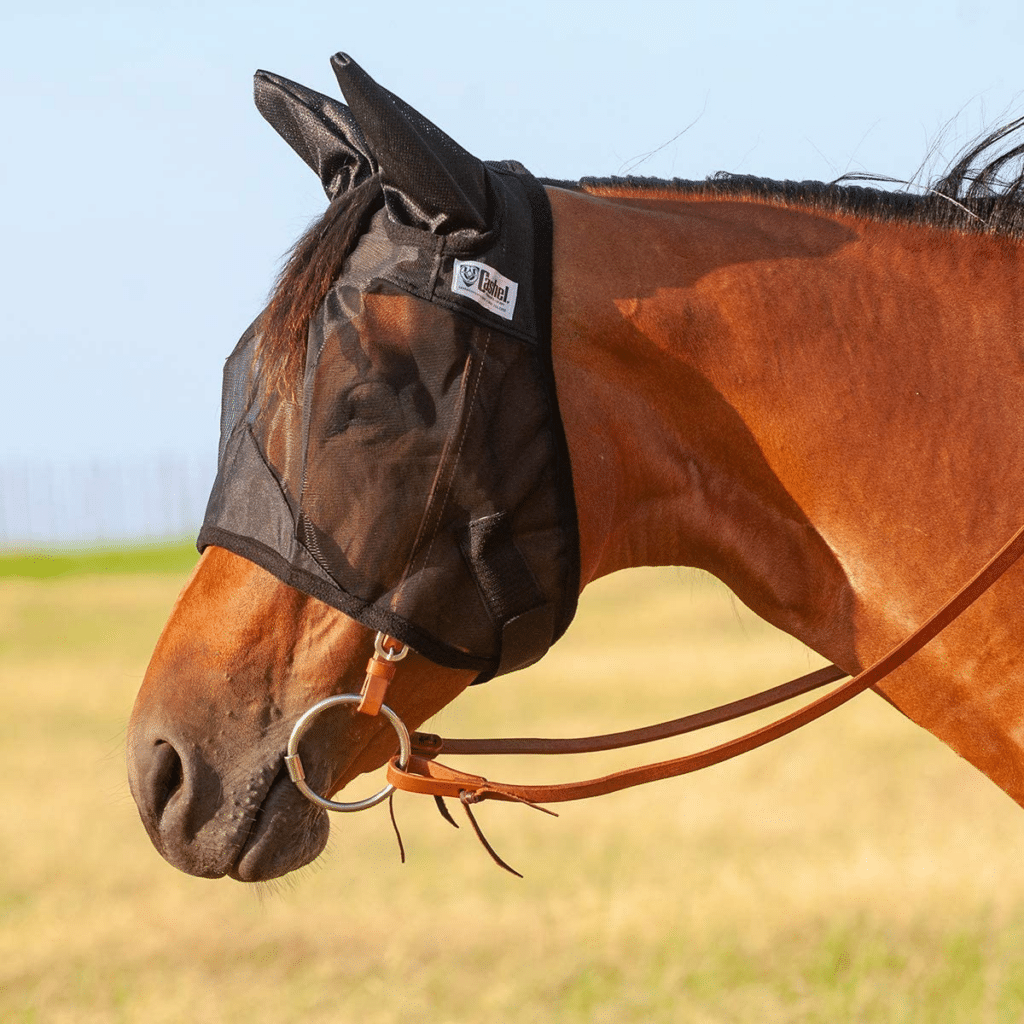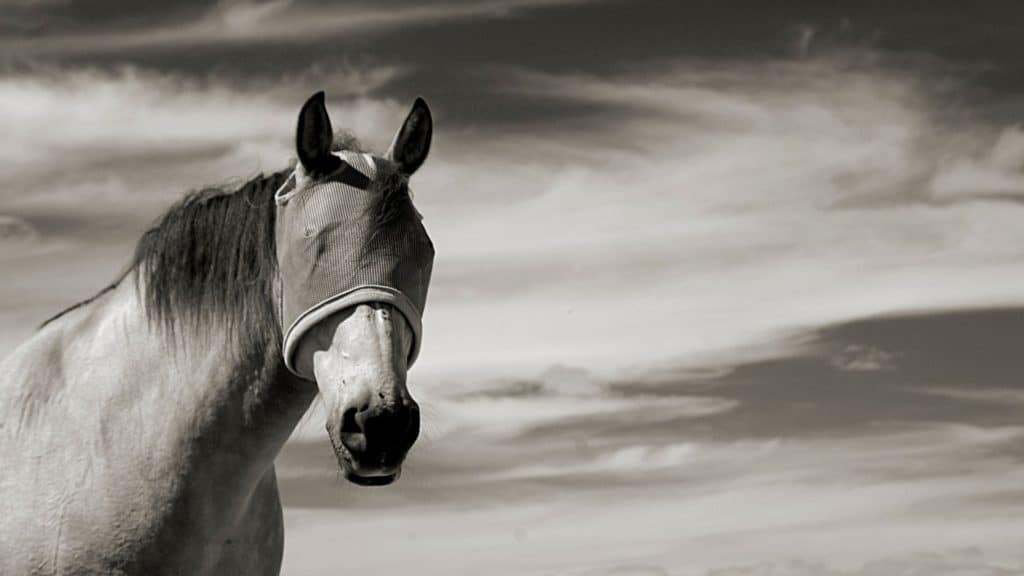Last updated: March 19, 2024
Any links on this page that lead to products on Amazon are affiliate links and I earn a commission if you make a purchase. Thanks in advance – I really appreciate it!
When we think about sun protection, we often consider our own skin and eyes, but how often do we think about our equine friends? Horses, just like humans, can suffer from the harmful effects of ultraviolet (UV) rays. Understanding the science behind UV rays and their impact on your horse’s eyes is crucial for ensuring their well-being and long-term health.

Protecting Your Horse’s Eyes from Sun Damage
Understanding the risks to horse eye health from UV rays is crucial, and it is essential to take proactive steps to protect your horse’s eyes.
The Importance of Horse Eye Protection.
Protecting your horse’s eyes from the harmful effects of UV rays is crucial for their overall health and well-being. Here are some effective methods and products to consider:
- Shaded Pastures: Ensure your horse has access to shaded areas where they can escape the direct sunlight, especially during peak sun hours.
- UV-Protective Fly Masks: Various fly masks offer UV protection, shielding the horse’s eyes from direct sunlight while allowing them to see clearly.
- UV-Protective Films for Stable Windows: Applying UV-protective films to windows can significantly reduce the amount of UV radiation entering the stable, providing a safer environment for your horse.
- Equine Sunglasses (EquiSunglasses): Specially designed sunglasses for horses, known as EquiSunglasses, can provide additional protection against UV rays for horses that are particularly sensitive or have existing eye conditions.
- Protective Eyewear for Riding: For horses exposed to intense sunlight during riding sessions, consider using protective eyewear that fits comfortably under bridles or headgear.
- Regular Veterinary Eye Exams: Regular check-ups with a veterinarian can help detect any early signs of UV damage or other eye conditions, allowing for timely intervention and treatment.
By incorporating these protective measures, you can help safeguard your horse’s eyes from UV damage and maintain their eye health.
Recognizing the Signs of UV Damage
Being vigilant about your horse’s eye health is key. Signs of UV damage can include squinting, redness, excessive tearing, or cloudiness in the eyes. If you notice any of these symptoms, it’s important to consult with a veterinarian promptly to assess for potential UV damage and discuss protective measures.
The Nature of UV Rays
UV rays from the sun can be both a blessing and a curse. While they’re essential for life, they also pose risks that we need to manage, especially for our horses.
What Are UV Rays?
UV rays are a form of electromagnetic radiation from the sun. Invisible to the human eye, these rays can be divided into three types: UVA, UVB, and UVC. While UVC rays are absorbed by the Earth’s atmosphere and don’t reach the ground, UVA and UVB rays can significantly affect human and horse eyes.
How UV Rays Affect the Eyes
Prolonged exposure to UVA and UVB rays can lead to various eye conditions, including photokeratitis (a painful eye condition caused by UV burn), cataracts, and even cancer of the eye and surrounding tissues. For horses, whose eyes are more exposed due to their size and the amount of time they spend outdoors, the risk is even greater.

FAQs
Why do horses need protection from UV rays?
Horses need protection from UV rays to prevent eye damage, including cataracts and other conditions that can impair vision or lead to discomfort and health issues.
What are the signs of UV damage in a horse’s eyes?
Signs of UV damage in the horse’s eyes include squinting, redness, excessive tearing, cloudiness, and visible discomfort in bright sunlight.
How effective are UV-protective fly masks?
UV-protective fly masks are highly effective in shielding horses’ eyes from harmful UV rays while allowing them to see clearly and enjoy outdoor activities.
Can horses wear sunglasses?
Yes, there are specially designed equine sunglasses, known as EquiSunglasses, that provide UV protection for horses, especially useful for those with sensitive eyes or existing eye conditions.
Can UV rays affect a horse’s behavior?
es, discomfort from UV exposure can lead to squinting and avoidance of bright areas, potentially affecting a horse’s willingness to train or perform outdoor activities.
Are there any specific breeds that require more eye protection?
While all horses can benefit from eye protection, those with lighter-colored eyes or less pigmentation around their eyes may be more susceptible to UV damage and may require additional protection.

Conclusion: UV Rays and Horse Eye Protection
The sun’s UV rays don’t just affect us; they can also pose a significant risk to our horses’ eyes. By understanding the science behind UV radiation and taking steps to protect our horses, we can help ensure their eyes remain healthy for years to come.
Have you had experiences with sun-related eye issues in your horses? Share your stories and tips in the comments below to help fellow horse owners navigate this important aspect of equine care.

About the Author: Miles Henry
Lifelong Horseman | Racehorse Owner | Published Author
Miles Henry brings over 25 years of hands-on experience training and owning Thoroughbred racehorses. Raised with Quarter Horses and Appaloosas, he’s spent a lifetime learning from horses—on the track, in the barn, and in the field. Today, he runs a small but successful racing stable in Louisiana and shares real-world insights on HorseRacingSense.com, helping horse owners, fans, and bettors navigate the sport with confidence.
📚 Books: View Miles’s books on Amazon »
🎧 Podcast Guest: Animal Tales Ep. 32 |
YouTube Interview
📩 Newsletter: Sign up for racing tips and horse care advice »
🔗 Follow Miles:
Twitter |
Facebook |
YouTube


